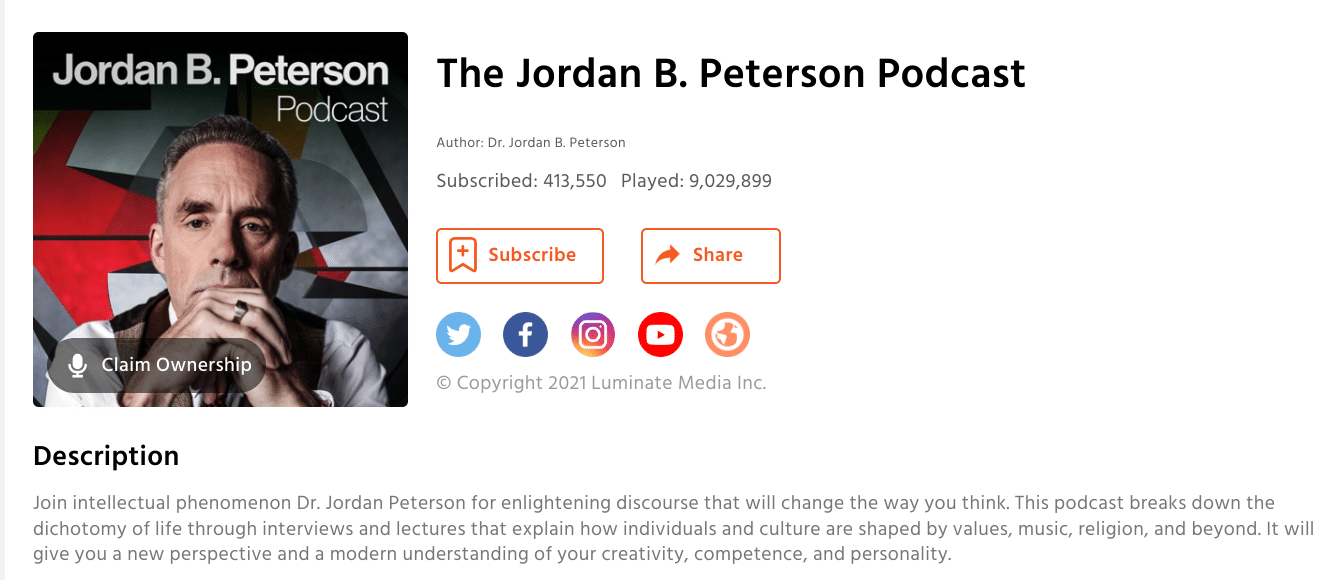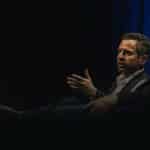The 12 Best Examples of the Jordan Peterson Podcast’s Mystique

The Jordan B. Peterson Podcast is a captivating and informative series hosted by the renowned Canadian psychologist, author, and professor Jordan Peterson. This popular podcast features engaging discussions on a wide array of topics, including psychology, philosophy, self-improvement, and societal issues. With millions of avid listeners tuning in regularly, the Jordan Peterson podcast has become a go-to resource for gaining valuable insights, practical wisdom, and learning about “the dichotomy of life.”
Whether you’re seeking guidance on personal growth or a deeper understanding of complex subjects, this podcast delivers thought-provoking content that leaves a lasting impact. Join the ever-growing community of listeners and immerse yourself in the enlightening conversations of the Jordan Peterson podcast to enhance your knowledge and enrich your life.
The discourse and criticism around the Jordan Peterson podcast revolve around his controversial viewpoints on various subjects, ranging from political issues to gender and identity, with supporters praising his insights while detractors raise concerns about his stances and the potential implications of his ideas.
Table of Contents
Who is Jordan Peterson?
Born in Canada, Jordan Peterson is a psychologist, author, and professor whose name has gained worldwide recognition. He is widely known for his insightful perspectives on various psychological and philosophical topics, including self-improvement, meaning, and personal responsibility.
With a profound impact on the online community, Jordan Peterson’s influential lectures, interviews, podcast, and books have captivated millions of individuals seeking guidance and understanding in their lives. His unique blend of academic expertise and practical wisdom has earned him a dedicated following, making him a prominent figure in the realm of psychology and self-help. T
he Jordan B. Peterson Podcast delves into insightful discussions on psychology, philosophy, and self-improvement, captivating millions with its enriching content. If you’re looking for profound insights into personal growth and navigating life’s complexities, Jordan Peterson’s work is an invaluable resource worth exploring, however, critics point to the negative discourse that tends to polarize his audience.
In Jordan Peterson’s biblical lecture series, he delves into the intricate relationship between the psychology of religion and theology, offering a unique perspective as a clinical psychologist. With a focus on the American church today and the broader religious movement, Peterson explores the architecture of belief and the impact of dogma, falsehood, and chaos on shaping individual and collective worldviews.
Through his insightful analysis, he navigates the complex terrain of biblical narratives, challenging traditional interpretations and shedding light on profound truths that resonate with diverse audiences seeking a deeper understanding of spirituality and human nature.
Jordan Peterson earned his Bachelor of Arts degree in political science from the University of Alberta in 1982. He then pursued further studies at McGill University, where he completed his Bachelor of Laws (LL.B) in 1985 and later obtained his Ph.D. in clinical psychology in 1991. He is a licensed psychologist and has had a successful career as a professor, teaching at various institutions, including Harvard University and the University of Toronto.
Jordan Peterson’s intellectual journey has been shaped by a diverse range of influences from various disciplines. Some of the significant influences on his thinking and work include:
1. Carl Jung: The Swiss psychiatrist Carl Jung’s ideas on psychology and the collective unconscious have greatly impacted Jordan Peterson’s understanding of human behavior and archetypes.
2. Friedrich Nietzsche: The German philosopher Friedrich Nietzsche’s concepts of the will to power and the eternal recurrence have influenced Peterson’s discussions on morality and existentialism.
3. Fyodor Dostoevsky: The Russian author’s exploration of human nature, morality, and suffering in his novels resonates with Peterson’s analyses of psychological and philosophical themes.
4. Aleksandr Solzhenitsyn: The writings of the Russian novelist and historian, particularly his account of the Soviet labor camps, have influenced Peterson’s views on totalitarianism and the importance of truth.
5. Jean Piaget: The Swiss psychologist Jean Piaget’s work on cognitive development has influenced Peterson’s understanding of the development of moral reasoning in individuals.
6. Joseph Campbell: The American mythologist’s ideas on the hero’s journey and the universality of myths have inspired Peterson’s exploration of archetypes and narratives.
7. George Orwell: The British author’s critiques of totalitarianism and the importance of individual freedom have informed Peterson’s discussions on political and societal issues.
These are just a few of the many influences that have played a role in shaping Jordan Peterson’s perspectives and ideas. His multidisciplinary approach draws from various fields, making him a unique and influential thinker in contemporary discussions on psychology, philosophy, and social issues.
The 12 Best Jordan Peterson Podcast Episodes
Jordan Peterson’s podcast has gained widespread influence due to its depth and competence in exploring various subjects, offering a merit-based approach to understanding complex ideas. Drawing inspiration from influential figures like Bonhoeffer, Squanto, and Socrates, Peterson provides a transcendent perspective that goes beyond conventional thinking. His innovative insights serve as an antidote to conventional discourse, captivating colleagues and listeners alike as they find inspiration and transformative knowledge within his thought-provoking discussions.
Biblical Series; Episodes 116-128
In this 13 part series, Jordan Peterson embarked on a series of lectures in 2017, exploring the ancient Biblical stories of Genesis from a psychological standpoint. Despite not identifying as a traditional theist, Peterson argues that these stories are fundamental to Western society, its laws, and its well-being.
By interpreting the Bible narratives through a psychological and existential lens, Peterson extracts valuable lessons from each tale, delving into the significance of human nature, tradition, and the importance of meaningful stories. While the lectures are lengthy, the major takeaways include understanding the nature of life and being, the impact of lofty ambitions, the power of choosing positivity over bitterness, and the importance of finding meaning in life.
Peterson emphasizes the significance of love and purpose and their role in fostering a fulfilled existence and defense against the world’s challenges.
Autism, Academics, and Animals with Dr Temple Gradin; Episode 318
Dr. Jordan B. Peterson engages in a discussion with Temple Grandin, a Professor of Animal Science at Colorado State University, covering topics like visual and verbal thinking, categorization, animal welfare, targeted activism, and the value of hands-on learning opportunities.
Temple Grandin’s impressive career includes designing livestock handling facilities used globally and pioneering animal welfare auditing programs adopted by major corporations. As an acclaimed author, her books, such as “Thinking in Pictures,” “Livestock Handling and Transport,” and “The Autistic Brain,” have gained recognition, with some making it to the New York Times Bestseller List. In recognition of her contributions, Grandin was inducted into the National Women’s Hall of Fame in 2017 and honored as a Colorado State Distinguished Professor in 2022.
Dream Analysis, AI, & Fairy Tales with Jonathan Pageau; Episode 364
Dr. Jordan B. Peterson engages in an insightful conversation with Jonathan Pageau, a renowned French-Canadian liturgical artist and icon carver. Together, they delve into the profound narratives present in classic fairy tales, the impact of woke culture on positive storytelling, the potential of AI to extract new insights from historical and biblical texts, and the criticism of postmodern cynicism.
They emphasize the crucial importance of preserving foundational storytelling and the exploration of symbolism across history and religion through Jonathan Pageau’s YouTube channel and online carving class, further enriching their meaningful exchange.
Enlightenment and the Righteous Mind with Steven Pinker and Jonathan Haidt; Episode 198
Dr. Peterson, Steven Pinker, and Jonathan Haidt come together for a thought-provoking discussion on truth, societal functioning, utopias, the significance of religion, and more. Steven Pinker, a renowned psychology professor at Harvard and accomplished American author, brings his insights from books like “Enlightenment Now” and “The Blank Slate,” while also contributing to reputable publications like The Guardian and The NY Times. Jonathan Haidt, a social psychologist at NYU Stern, shares his research on cross-cultural moral foundations, reflecting on his works such as “The Righteous Mind” and “The Coddling of the American Mind,” with his upcoming book, “Three Stories about Capitalism,” anticipated in 2022.
An Atheist in the Realm of Myth with Stephen Fry; Episode 169
In this episode of the Jordan B Peterson Podcast, Peterson is joined by the multi-talented Stephen Fry, a notable British actor, writer, comedian, journalist, and intellectual with a wide-ranging list of accomplishments. They engage in a captivating conversation encompassing drama, literature, politics, and delve into subjects like atheism, religion, rationalism, empiricism, myths, and stories. Additionally, our discussion touches on bartering with reality, Greek and Egyptian mythology, the presence of cruelty in the world, and the merits of constitutional monarchy versus a democratic republic, among many other intriguing topics.
From the Beginning to Now with Lawrence Krauss; Episode 182
In this episode of the Jordan Peterson Podcast, Jordan is joined by Lawrence M. Krauss, an esteemed American-Canadian theoretical physicist and cosmologist known for his significant contributions to particle physics and cosmology research. Dr. Krauss has held positions at prestigious institutions such as Yale University, Case Western Reserve University, and Arizona State University. He is also the founder of ASU’s Origins Project, a non-profit organization that hosts public discussions on science, culture, and social matters. Alongside his scholarly work, Dr. Krauss has authored popular books like “The Physics of Star Trek” and “A Universe from Nothing,” which have garnered widespread attention.
Toxic Masculinity – A 12 Rules for Life Lecture; Episode 52
“12 Rules for Life” by Jordan Peterson offers a profound and practical guide to finding meaning and order in an increasingly chaotic world. Drawing from a combination of psychology, philosophy, and personal experiences, Peterson presents twelve life principles that aim to help readers confront challenges and transform their lives positively. Each rule, such as “Stand up straight with your shoulders back” and “Compare yourself to who you were yesterday, not to who someone else is today,” is accompanied by engaging stories and insightful explanations, empowering individuals to take responsibility for their actions, embrace their potential, and find purpose in the face of adversity.
Nietzche, Dostoevsky, Kierkegaard (Existentialism); Episode 148
This lecture, the 11th in the 2017 series, explores the giants of existentialism—a philosophical and psychologically grounded perspective that contends (1) mental illness or distress is inherent in human existence, and (2) embracing responsibility through action is the fitting response to life’s challenges.
Exploring the Pareto Principle; Episode 200
In this episode, Peterson explores the Pareto Principle, introduced by Vilfredo Pareto, an economist born in 1848, which states that 80% of consequences result from 20% of the causes, indicating an uneven correlation between inputs and outputs. This principle serves as a general reminder of the imbalanced nature of relationships between inputs and outputs. Known by various names like the Pareto Rule, the 80/20 Rule, or the Matthew Principle, Peterson frequently employs this principle to highlight the complex and multifaceted nature of inequality, illustrating that there is no simple answer to this intricate issue.
Your Dark Side and Control Over Your Life with Robert Greene; Episode 237
In this episode, Robert Greene joins the discussion to explore human nature and the principles related to strategy, power, and seduction. The conversation delves into the motivations behind power, deceptive strategies, Robert’s diverse career journey before becoming an author, psychopathy, manipulation, agreeableness, and grappling with guilt over ambition. Additional topics covered include channeling one’s shadow and more. Robert Greene, renowned for his NY Times bestsellers like “The 48 Laws of Power” and “The Art of Seduction,” is hailed as an international expert on power strategies, attracting a wide following in the business world and Washington DC, along with admiration from individuals ranging from war historians to prominent musicians like Jay-Z, Drake, and 50 Cent.
Julian Assange: Free Speech Martyr? Featuring Stella Assange; Episode 293
In this discussion, Stella Assange and Dr. Jordan B. Peterson delve into the crucial topics of freedom of information, the impact of internet journalism, and the case of Julian Assange, who is considered a prominent political prisoner in the western world. Stella Assange, a lawyer with degrees in law, politics, refugee law, and public international law, passionately advocates for her husband’s freedom. Julian Assange, the founder of Wikileaks, and unofficial author of free speech, gained notoriety for publishing classified government documents, resulting in his unlawful imprisonment. Presently, Stella is at the forefront of the fight for Julian’s freedom and the broader cause of preserving information freedom.
You Probably Should Have Read The Bible | Franciscan University; Episode 251
Recorded on April 4, 2022, this episode features Jordan Peterson’s speech at the Franciscan University of Steubenville, where he shares his recent reflections on ethics, scripture, and the intricacies of perception. He prompts the audience to consider why we easily remember great stories but quickly forget bad ones, why Western culture took the form of a book rather than other alternatives, and whether the West can truly be characterized as a “phallogocentric” culture. Jordan proposes a radical claim—that many problems we perceive as navigational challenges are actually veiled ethical dilemmas—as he delves into the complexities of navigating the value structures we encounter in reality.
How Popular is The Jordan Peterson Podcast?

Jordan Peterson’s podcast popularity has seen an increase since his suspension from Twitter. Defended by his daughter, Mikhaila Peterson, she pointed out that he went from “#45 in Apple podcasts to #25 since Twitter banned him.” Despite the suspension impacting his Twitter following, Jordan Peterson’s podcast has remained successful, ranking at number 1 in the educational categories on Apple charts in both the U.S. and the U.K. The podcast’s steady position on Spotify, reaching its highest ever ranking of 44 among all podcasts listened to in the United States, further solidifies its enduring appeal. Despite the Twitter ban, Peterson continues to produce content and videos, including an article he wrote for The Guardian titled “Why Twitter is Insane.”
Best Jordan Peterson YouTube Videos & Lectures
- Biblical Series
- Africa is not Poor Because of Colonization
- Identity Politics and the Marxist Lie of White Privilege
- Talking to Muslims About Christ
- Maps of Meaning
- 12 Rules for Life Tour
- Who Dares Say He Believes in God?
- Carl Jung Series
- Existentialism: Nazi Germany and the USSR
Jordan Peterson and Joe Rogan
Jordan Peterson and Joe Rogan share a professional relationship as well as a personal friendship. They have appeared together on Joe Rogan’s popular podcast, “The Joe Rogan Experience,” multiple times. During these episodes, they engage in deep and wide-ranging conversations covering various subjects, including psychology, philosophy, political issues, and more. Their dynamic and engaging discussions have resonated with millions of listeners, leading to a strong bond between the two intellectual figures. Beyond the podcast appearances, they have expressed mutual respect for each other’s work and ideas, contributing to their close friendship. Their collaborations have significantly contributed to their individual popularity and have solidified their status as influential voices in their respective fields.
Related reading: Best Joe Rogan Podcast Episodes
The Jordan Peterson podcast stands as a compelling and influential platform, drawing millions of listeners with its insightful discussions on psychology, philosophy, and personal growth. Peterson’s unique blend of academic expertise and practical wisdom has captivated audiences worldwide, offering a refreshing perspective on a diverse range of topics. Through engaging conversations with prominent guests and his own thought-provoking insights, the podcast continues to serve as a valuable resource for those seeking guidance, understanding, and inspiration in their lives. With its enduring impact and ever-growing following, the Jordan Peterson podcast remains an essential destination for individuals on their journey of self-discovery and intellectual exploration.
The Mystique of Jordan B. Peterson
Dr. Jordan Peterson is, without question, a polarizing figure. Like so many thinkers, some of his ideas are really out there, while others contain pearls of wisdom that are practical and can be applied to life. So you take the good with the bad, and walk away with what you want.
After all, there’s a big difference between being exposed to an idea and adopting an idea. It’s more important than ever to be aware of ideas that we may not agree with, but should still understand. Cool the temperature down a little bit.
With Dr. Peterson being de-platformed from so many other mediums, the Jordan Peterson Podcast is not only one of the last ways to hear his ideas but, one of the more discreet ways. Nobody knows what’s playing on those earbuds while you’re on the subway. So expand your horizons… or get really angry. But know why you’re mad. It’s healthier that way.















Comments
Comments are closed.